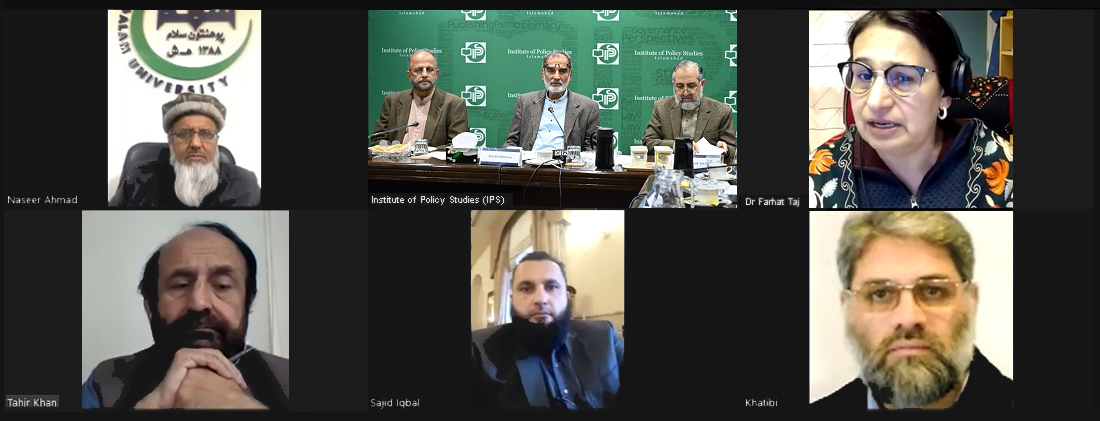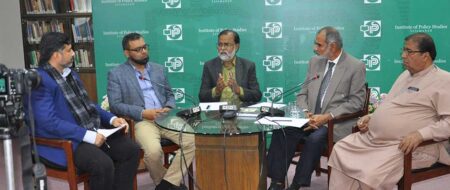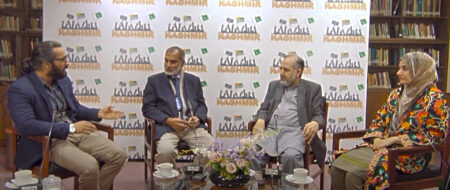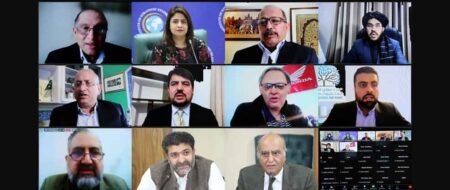‘Understanding Pakistan’s Campaign to Evacuate Illegal Immigrants’
Pak-Afghan inclusive commission mooted amid concerns over repatriation of illegal Afghans
Pakistan’s move to repatriate illegal and undocumented immigrants has raised multifaceted concerns, particularly among Afghans, which should be addressed through a comprehensive approach. This necessitates the establishment of a commission comprising representatives from both governments, their civil society, and academic and religious communities.
Such a representative body can foster constructive engagement and cooperation to leverage the pull factors in Afghanistan and create incentives for Afghan refugees in other countries as a comprehensive approach.
This was discussed during an extended in-house session, ‘Understanding Pakistan’s Campaign to Evacuate Illegal Immigrants,’ held at the Institute of Policy Studies (IPS), Islamabad, on November 22, 2023.
The session, chaired by Khalid Rahman, chairman, IPS, was addressed by Ambassador (r) Syed Abrar Hussain, vice chairman, IPS, Prof. Dr. Fakhr-ul-Islam, advisor, research and academic outreach, IPS, Dr. Attaullah Wahidyar, Afghanistan’s former deputy minister for education, Naseer Ahmed Nawidy, head of Research Center, Salam University, Kabul, Haroon Khatibi, chairman, Humanitarian Assistance Society, Afghanistan, Salman Javed, director, Pak Afghan Youth Forum, Juma Khan Sufi, an expert on Pak-Afghan relations, Dr. Farhat Taj, associate professor, University of Tromso, Norway, Dr. Sajid Iqbal, National University of Modern Languages (NUML), and senior journalists and experts on Pak-Afghan affairs Mehmood Jan Babar and Tahir Khan,.
The discussion put forward a spectrum of perspectives regarding Pakistan’s recent decision to repatriate illegal and undocumented immigrants. Ambassador Abrar Hussain reflected on Pakistan’s multifaceted challenges and highlighted the complexity of Pakistan-Afghanistan relations amid heightened tensions due to security concerns linked to the recent escalation in violence.
Presenting Afghanistan’s perspective, the speakers highlighted that Pakistan has the legal right to deport whoever it deems fit, and this right cannot be contested. However, the decision to expel illegal immigrants, which include 1.7 million Afghans, seems to have been made in haste and without proper planning, they said.
They raised the concern that the Afghanistan government might not be able to facilitate all returning Afghans, and this may create a humanitarian crisis. Therefore, voices are being heard that the decision should be rescheduled, particularly due to the winter. They stressed adopting civil and political ownership as a way forward to minimize the chances of a humanitarian crisis.
Presenting Pakistan’s perspective, the speakers maintained that Pakistan has hosted Afghan refugees in the spirit of Muslim brotherhood because of the instability in Afghanistan. Now that the country is at peace, it is only fair that undocumented immigrants should return to their homeland. It is to be noted that Pakistan is still hosting around 2.7 million Afghans and is also engaged in the resettlement of Afghan refugees in third countries.
The speakers stressed that reversing the decision would not benefit either state, and the process should be completed. Furthermore, the perception of haste in Pakistan’s sudden announcement, coupled with a short one-month deadline, has generated misconceptions for which there should be a counter-narrative in both countries. They added that it is pertinent that Pakistan should outline its policy clearly.
The speakers suggested that a diplomatic solution should be found to related inter-state issues. A panel or commission comprising representatives from both governments, their civil society, and academic and religious communities should be formed to address this problem and assess related security concerns.
In his concluding remarks, Khalid Rahman said that the recent decision, although not ideal, demands acceptance. While acknowledging the paramount importance of security considerations, he stated that relying solely on the security lens may pose challenges because the geopolitical environment in Afghanistan has shifted after 2021.
The situation has also been manipulated by both external and internal elements seeking to disrupt relations between the two countries. Therefore, diplomatic measures must not be replaced by media-driven resolutions in settling inter-governmental disputes. Moreover, a well-crafted pre- and post-decision narrative could have effectively dispersed the negative perceptions in the narrative-driven landscape.
He stressed that a comprehensive approach is imperative, necessitating the establishment of a representative body involving both sides to address pull factors and create incentives, including potential pathways to citizenship.





